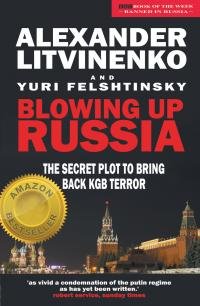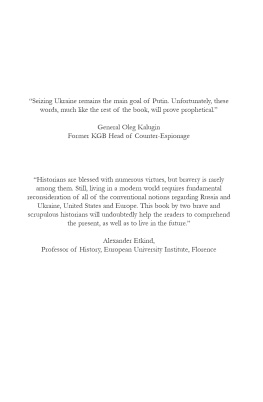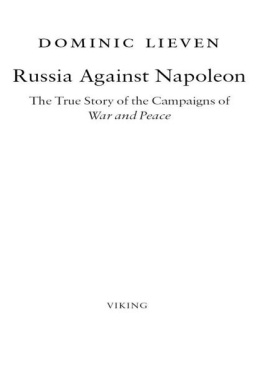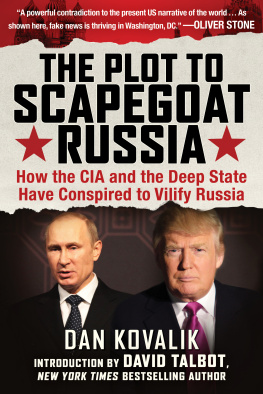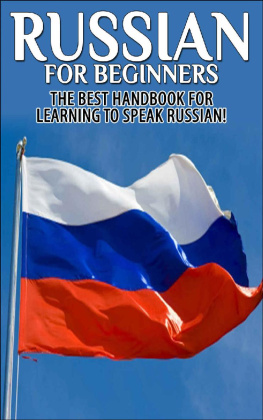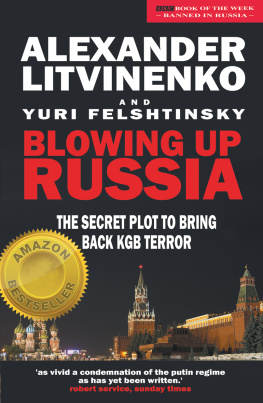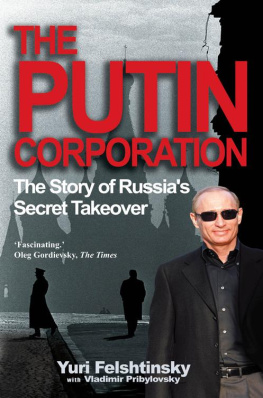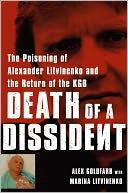Crucially important. Robert Service, Professor of Russian History Oxford University
SUNDAY TIMES BEST BOOK
BBC BOOK OF THE WEEK
EVENING STANDARD BESTSELLER
For clues as to who wanted Alexander Litvinenko, you need look no farther than Blowing up Russia.
Oleg Gordievsky The Times
Blowing up Russia demands our attention.
Nicholas Shakespeare Daily Telegraph
A vivid condemnation of the Putin regime as has yet been written.
Sunday Times
Amazing.
Thriller writer Tim Rob Smith, Metro
Frightening.
Sunday Telegraph
Disturbing reading.
Mail on Sunday
One of the severest attacks on the present Russian leadership in print.
Tribune
Rich in political intrigue.
Good Book Guide
Pull-no-punches expos.
Independent
Iconic.
Sunday Business Post (Ireland)
A book that should contain a very serious health warning on the cover.
Andrew Marr, Sunday AM
Was Litvinenko murdered because of this book?
Irish Independent
A spy shocker.
Western Morning News
A wake-up call.
Johannes Baun, Danish publisher of Politkovskaya
Tightly argued.
Sunday Times
*** BANNED IN RUSSIA ***
TRANSLATED in Italy, Japan, Germany, Portugal, Brazil, Slovenia, USA, France, Denmark, Netherlands, Finland, Hungary, Latvia, Estonia, Ukraine, Bulgaria, Poland, Spain, Lithuania, Croatia, Romania
Blowing up Russia is the first book to be banned in Russia since The Gulag Archipelago in 1974. It dramatically exposes how the spymasters of the KGB were able to survive the collapse of Communism. In a plot akin to the 1933 burning of the German Reichstag, secretive, murderous methods were used to catapult President Vladimir Putin into power.
Alexander Litvinenko served in the Russian military for more than 20 years achieving the rank of Lieutenant-Colonel. In 1999 he was arrested and imprisoned on charges that were later dismissed. After continuing further charges (equally dismissed), he escaped from Russia, and lived with his family in Great Britain, where he was granted political asylum in 2001. He was murdered in 2006 in a sushi restaurant in London.
Yuri Felshtinsky studied history at Brandeis University and Rutgers University, where he received his Ph.D, and was a Hoover Institute Fellow. He lives in Boston and is an expert in the history of Russian secret service from Lenin to the present day. He was one of the last people to speak to Alexander Litvinenko hours before he succumbed to radio-active poisoning by Polonium 210.
Alexander Litvinenko
Yuri Felshtinsky
BLOWING UP RUSSIA
The Secret Plot to Bring Back KGB Terror
Acts of Terror, Abductions, and Contract Killings
organized by the Federal Security Service
of the Russian Federation
Translated from Russian by Geoffrey Andrews and Co.
GIBSON SQUARE
LONDON
CONTENTS
Foreword
Introduction
Abbreviations and Terms
Chapter 1
The FSB Foments War in Chechnya
Chapter 2
The Security Services Run Riot
Chapter 3
Moscow DetectivesTake on the FSB
Chapter 4
Nikolai Patrushev: A Biographical Note
Chapter 5
The FSB Fiasco in Ryazan
Chapter 6
The FSB Resorts to MassTerror:
Buinaksk, Moscow, andVolgodonsk
Chapter 7
The FSB Against the People
Chapter 8
The FSB Sets Up Free-Lance
Special Operations Groups
Chapter 9
The FSB Organizes Contract Killings
Chapter 10
The Secret Services and Abductions
Chapter 11
The FSB: Reform or Dissolution?
In Place of a Conclusion
The FSB in Power
Epilogue
About the Authors
New Foreword
Alexander Litvinenko was poisoned in November 2006 in London. Almost a decade on, something still prevents us from forgetting about this man and putting a period at the end of his life story. What is it?
It is the remarkable but true fact that, while Litvinenko was alive, he was not listened to or heard. He gave dozens of interviews, most of which were published in the Russian migr press and were not noticed by the main Western media or experts on Russia. Blowing Up Russia, the book he and I wrote and which came out in a special edition of the Novaya Gazeta newspaper in Moscow in August 2001, was not picked up by a single foreign publisher. Today, it has been published in many countries in the civilized world. And those who never heard of Litvinenko during his life remember in detail the story of his assassination. Even those who know little about the periodic table will have heard of Polonium-210, the toxin that killed him in an agonising way.
After Alexanders death, what many had regarded as fantasy turned out to be the truth, and in fact only the tip of an enormous, frightening iceberg called Russias security services. This conglomerate,* which remained in the shadow during the years of Soviet rule, today owns and governs Russia as a private joint-stock companya kind of corporation which pays dividends based on the percentage of shares in the hands of this or that shareholder, and whose shares are distributed among politicians and officials most of them officers of the FSB and other intelligence agencies, or are purchased by Russian billionairesa number of whom are also former employees or agents of the security services. It stands to reason that in such a system the greatest influence is enjoyed by the head of the corporations board of directorsRussian President Vladimir Putin. Nor is it surprising that he, too, is a long-time officer of the KGB-FSB, with the rank of colonel, and a former head of the Federal Security Service of Russia (FSB).
Such is the background of what can only be called the public execution of Alexander Litvinenko in view of the entire world.
* See my book The Putin Corporation (new edition, London 2012).
In December 2012, at a pre-inquest hearing into Litvinenkos death, counsel for Marina Litvinenko, Alexanders widow, stated that Mr Litvinenko had been for a number of years a regular and paid agent and employee of MI6 with a dedicated handler whose pseudonym was Martin. He stated that at the behest of MI6, Litvinenko was also working with Spanish intelligence, with a handler named Uri. Litvinenko was supplying the Spanish with information on organized crime and Russian mafia activity in Spain. Counsel added that the inquest should consider whether MI6 failed in its duty to protect Litvinenko against a real and immediate risk to life. He suggested that there was an enhanced duty resting on the British government to ensure his safety when tasking him with dangerous operations involving engagement with foreign agents.
Indeed, among the many documents Alexander gave me in London in the beginning of 2003 was one that shows in particular how close he had become to MI6. It relates to the visit of KGB-FSB general Sergei Ivanov to London from October 30 to November 1, 2000. The general was, at that time, Secretary of the Russian Security Council (he is currently the chief of the presidential administration, he second most powerful post in Russia after President Vladimir Putin). This 4-page confidential document about the highly-sensitive visit had been faxed from London to the British Embassy in Moscow on November 2, 2000 and was given to Alexanderby MI6 for expert analysis.
Whether Litvinenko was in 2006 still working for MI6 on a permanent basis and for a salary, or whether it only appeared so to the paranoid FSB, was irrelevant. If Russias spy agencies picked up rumours in 2006 indicating that Litvinenko had begun to cooperate permanently with British and Spanish intelligence, this could have become, in Moscow, one of the main arguments in favour of a decision to eliminate him. Russias intelligence agencies would have assumed that their former spy had betrayed them. To be working in London for a fugitive Russian oligarchBoris Berezovsky, another Russian migr who died under suspicious circumstances, apparently committing suicide from a shower curtain rail on 23 March 2013was one thing. To be working for the security services of two countries was quite another. For a former officer of the KGB-FSB, collaboration with foreign intelligence is sufficient grounds for a death sentence. A rare radioactive poison seems an unexpected way of killing a former colleague. However, Soviet (Russian) intelligence agencies have been using radioactive poisons for over half a century. The first recorded instance of a radio-active attack happened in Frankfurt in 1957, and involved the of Soviet defector Nikolai Khokhlov, a captain in the Soviet security services, who was given odourless thallium in a cup of coffee (a list may be found in Chapter 11 The Age of Assassins in
Next page
